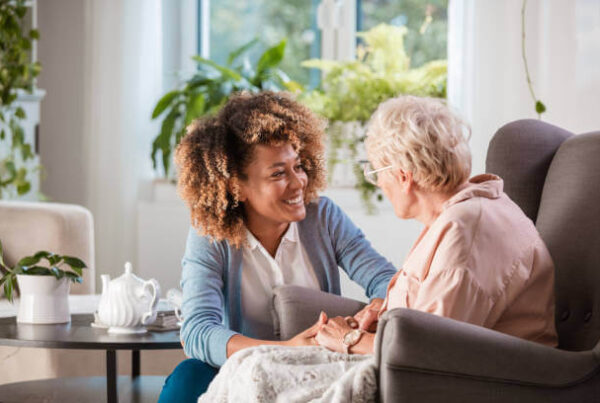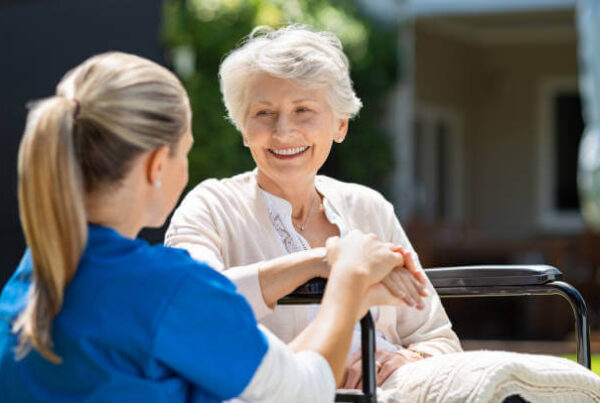Later in life, happiness and the quality of life are a paramount consideration. The senior stage of life is often a time when people place a greater focus on better health.
Loneliness and social isolation can impact their vision for a carefree, joyful lifestyle. Loneliness affects seniors’ physical and mental health, and life’s changes don’t always make that any better.
For example, consider these normal life changes that can lead to social isolation:
- The death of a spouse
- The loss of a friend network, especially if it’s due to serious illness or death
- A necessary change in the person’s residence
- Concern over becoming a burden to others
- Safety concerns when going out
- Fear of living alone
- Dementia, Alzheimer’s, or serious illness
- Difficulty hearing, speaking, or understanding
- Adult children who are geographically distant
Professional caregivers can be a catalyst to help seniors live as independently as possible, participate in activities they enjoy and provide them with companionship.
What the Research Says: The Effects of Senior Loneliness
It’s perfectly normal to feel lonely once in a while, even for people that enjoy a healthy social life, so why is isolation bad?
Research on elderly loneliness shows that adults over the age of 50 who often feel alone experience greater health risks than other populations.
Here’s what we know about the health effects of loneliness:
- People who feel alone have a significant risk of dying prematurely: This risk exceeds the risks of dying due to other major causes such as smoking, obesity, and physical inactivity
- The risk of dementia is 50% higher in people that experience social isolation
- Those who have poor social relationships in quantity or quality may have a 29% increased risk of getting heart disease and a 32% increased risk of having a stroke
- Lonely people have higher rates of depression, anxiety, and suicide
- Heart failure patients who admit to being lonely are four times more likely to die, have a 68% increase in hospitalizations, and a 57% increase risk of emergency room visits
Mitigating the Effects of Social Isolation and Loneliness in Seniors
Caregivers can be instrumental in reversing the effects of social isolation and loneliness in seniors by proactively encouraging them to remain socially active and help make it possible for them to attend social activities.
See the following list of the effects of mental health and physical health your senior can avoid by becoming more socially active:
1. Increased Risk of Alzheimer’s Disease
Alzheimer’s is a brain disorder that impacts a person’s thoughts, emotions, and social capabilities. Regular doses of social interaction help keep the brain active, which can reduce the effects of Alzheimer’s.
2. Poor Bone Health
Socially active seniors also tend to be more physically active than seniors who experience loneliness. Regular physical activity helps to prevent problems with bone health and bone conditions like osteoporosis, and it helps to increase muscle strength, balance, and coordination.
3. Depression
Boredom and loneliness are often a precursor to feelings of sadness, anger, anxiety, and other emotions which can lead to depression or worsen existing depressive issues.
Our bodies naturally release positive endorphins that help to lower stress and anxiety, and regular socialization with people helps keep these endorphins flowing, so seniors can enjoy better moods and less depression.
4. Heart Disease
Social isolation, along with excessive worry, sleeplessness, and inflammation can be taxing on the heart, causing it to age prematurely. These issues can put inactive seniors at a higher risk of a stroke or heart attack than active seniors.
Socially active seniors tend to experience lower blood pressure, reduced stress, and better cholesterol levels – all things that increase circulation and reduce the stress on the heart.
5. Longevity
One of the more serious health problems of loneliness is the negative impact on longevity. Social activity helps to strengthen seniors’ senses and brain function. Both of these things help to reduce the risks of illnesses and death in the senior population.
Loneliness and Isolation Increase Mortality Rates
All other things being equal, the mortality rates in older men and women are higher in socially isolated seniors than in socially active older adults. The research shows that reducing social isolation and loneliness improves well-being and the quality of life, and improves the prospects for longevity, particularly when it comes to reducing isolation.
With the large numbers of seniors choosing to age in place, professional caregivers providing senior care help to promote social wellbeing which also helps to improve mental and physical health, as well as help seniors continue living safely in the comfort of their homes. To hire a professionally trained caregiver in Wisconsin, call Advanced Care at 262-236-9194.





